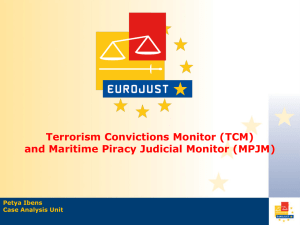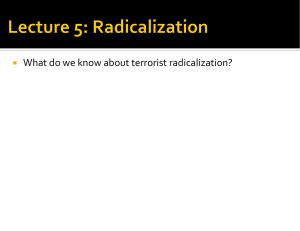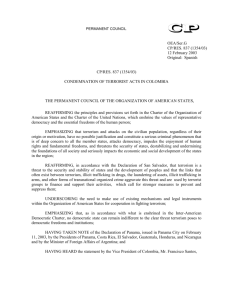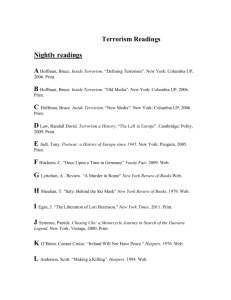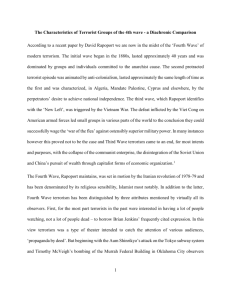Legislating Against Terrorism – The French
advertisement
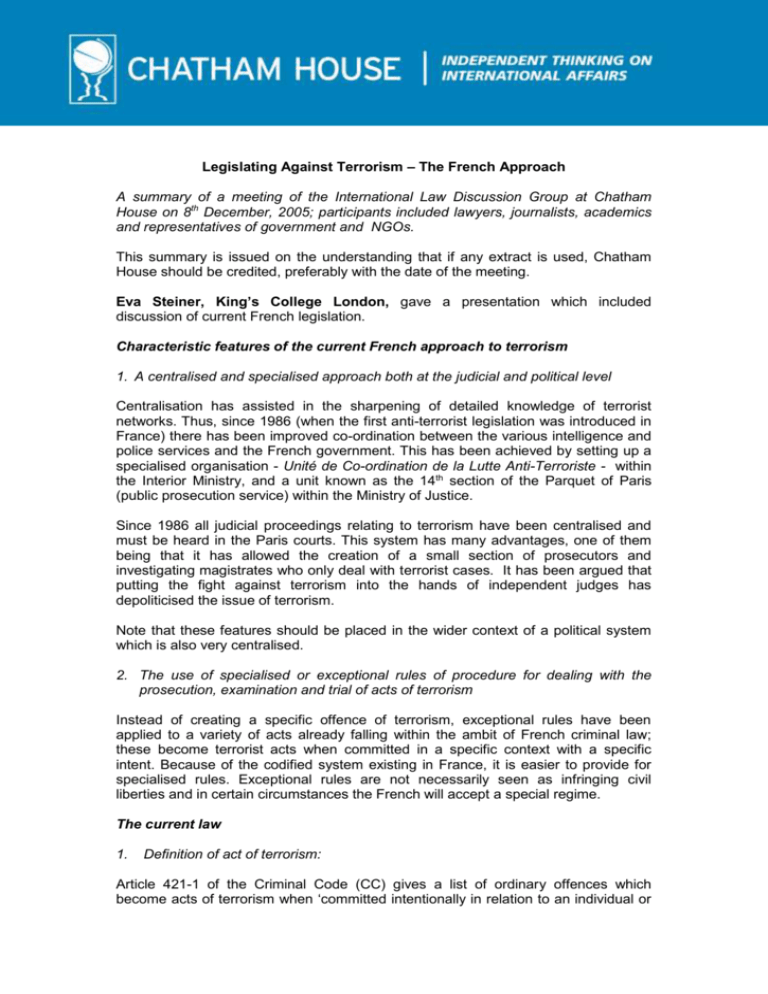
Legislating Against Terrorism – The French Approach A summary of a meeting of the International Law Discussion Group at Chatham House on 8th December, 2005; participants included lawyers, journalists, academics and representatives of government and NGOs. This summary is issued on the understanding that if any extract is used, Chatham House should be credited, preferably with the date of the meeting. Eva Steiner, King’s College London, gave a presentation which included discussion of current French legislation. Characteristic features of the current French approach to terrorism 1. A centralised and specialised approach both at the judicial and political level Centralisation has assisted in the sharpening of detailed knowledge of terrorist networks. Thus, since 1986 (when the first anti-terrorist legislation was introduced in France) there has been improved co-ordination between the various intelligence and police services and the French government. This has been achieved by setting up a specialised organisation - Unité de Co-ordination de la Lutte Anti-Terroriste - within the Interior Ministry, and a unit known as the 14th section of the Parquet of Paris (public prosecution service) within the Ministry of Justice. Since 1986 all judicial proceedings relating to terrorism have been centralised and must be heard in the Paris courts. This system has many advantages, one of them being that it has allowed the creation of a small section of prosecutors and investigating magistrates who only deal with terrorist cases. It has been argued that putting the fight against terrorism into the hands of independent judges has depoliticised the issue of terrorism. Note that these features should be placed in the wider context of a political system which is also very centralised. 2. The use of specialised or exceptional rules of procedure for dealing with the prosecution, examination and trial of acts of terrorism Instead of creating a specific offence of terrorism, exceptional rules have been applied to a variety of acts already falling within the ambit of French criminal law; these become terrorist acts when committed in a specific context with a specific intent. Because of the codified system existing in France, it is easier to provide for specialised rules. Exceptional rules are not necessarily seen as infringing civil liberties and in certain circumstances the French will accept a special regime. The current law 1. Definition of act of terrorism: Article 421-1 of the Criminal Code (CC) gives a list of ordinary offences which become acts of terrorism when ‘committed intentionally in relation to an individual or collective undertaking the purpose of which is seriously to disturb the public order by intimidation or terror.’ According to the existing case law, the defining feature of the ‘undertaking’ is the level of professionalism and strategy used. A minimum of planning and preparation is required for the offence. Amongst the offences listed in article 421-1 which are capable of becoming acts of terrorism are murders, abduction and kidnapping, hijacking of planes, vessels, the production, sale, import or export of explosive substances and more recently offences related to money laundering and insider dealing. Under article 421-2-1 CC ‘the participation of any group or association established with a view to the preparation, marked by one or more material actions, of any of the acts of terrorism provided for in previous articles shall in addition be an act of terrorism’. This has been very controversial as it has justified waves of arrest in Paris and indiscriminate detention of suspects. The vagueness of the law has been condemned. Also punished are the participation in any group formed or association established with a view to the preparation of act of terrorism (article 421-2-1 CC), the funding of terrorist groups (article 421-2-2 CC) and what has been named ‘ecological terrorism’ i.e the introduction -into the atmosphere, ground, soil, water and food products- of substances liable to imperil human or animal health or the natural environment (article 421-2 CC). Again these are quite vague provisions. 2. French anti-terror laws provide exceptional rules for the prosecution, examination and trial of terrorist acts: Terrorist suspects can be held in police custody before being charged for four days rather than two as is the norm. The further extension of up to 48 hours above the two days must be authorised by the examining magistrate. However, the first extension of 24 hours after the two days must be accompanied by a prior medical examination of the suspect with a view to ensuring that he is fit to stand further detention. A terror suspect in custody has the right of access to a lawyer as from the 72nd hour of his detention (article 706-88 Code of Criminal Procedure-CCP). In ordinary procedure access to a lawyer is currently granted as from the start of the detention (article 63-4 CCP). Under article 145-2 CCP, a suspect may be held in pre-trial detention after having been charged for up to four years in terrorist cases. Usually suspects can be held for up to two or three years without trial depending on the seriousness of the offence. The European Court of Human Rights has condemned France for these time periods in both terrrorist and non-terrorist cases. Whereas in ordinary circumstances searches in storage spaces of houses can only be conducted from 6 am, in the context of terrorism night-time searches are permitted (arts 59, 706-90 and 706-91 CCP). Following the September 11 terror attacks France’s Parliament further adopted tougher antiterrorism measures that gave police the right to search cars without judicial warrant (article 78-2-2 CCP) and to obtain subject to warrant by an investigating magistrate access to private telephone calls (art. 706-95 CCP). Both these measures have been very controversial. The law also provides for longer sentences for acts committed for the purpose of terrorism. Thus, it will be a life sentence if in ordinary circumstances the term provided is 30 years (article 421-3 CC). The new French Anti-Terror Bill The principal measures to be found in the new bill (passed by the National Assembly but not the Senate) can be summarised as follows: Greater use of video surveillance in places considered as potential targets to terrorist attacks. This includes places of worship and department stores. Permission to install surveillance cameras for a period of five years must be granted by a special commission headed by a judge. Police officers are entitled to watch images generated by such surveillance cameras. In cases of emergency the Prefect can authorise for four months the installation of surveillance cameras without recourse to the normal procedure (article 1). Installation of surveillance cameras can be imposed upon public transport authorities, airports, or nuclear power stations (article 2). (There are more restrictions on such cameras in France as compared to the UK for example due to France’s strict privacy laws). Identity checks legislation is extended for international trains up until the first station following the cross over point (article 3). Obligation for internet service providers and cyber cafes to store files on all their customers’ activities for up to one year with the possibility of access for police services without warrant to the data stored. However, retention and communication of data are restricted to technical data such as identification and not to content (articles 4 and 5). General power of access for the police to computerized record systems and files held by various official bodies such as driver vehicle licence records (article 8) Increased penalties for membership and involvement with terrorist groups (from 10 to 20 years imprisonment) (article 9). Extension of the period of time during which it is possible to initiate proceedings to take away French nationality from a person found guilty of an act of terrorism (article 11). This is important because there have been problems with immigration laws in France and civil rights watchdogs have queried whether this is a way of doing away with immigration programmes. A power vested in the Economics Minister to freeze assets of terrorists or organisations aiding or financing terrorist activities for a period of six months which is renewable (article 12). Civil liberties and anti-terrorist legislation There are two ways of protecting civil liberties in France. The first is by way of review by the Conseil Constitutionnel. This body scrutinises legislation for compatibility with the Constitution (which incorporates the Declaration of the Rights of Man and of the Citizen). The Conseil Constitutionnel has taken a relaxed approach to scrutinising anti-terrorist legislation provided the presumption of innocence and the rights of the accused are not infringed in a major way. The second is that the European Convention on Human Rights is directly applicable in French law. If there is a conflict before the court between French law and the European Convention the Convention rights will prevail and the French law can be set aside. The French approach to the concept of civil liberties differs to that of the UK. The notion of the importance of the collective pervades the law in France. The French would say that their ability to move safely around in the collective public space is a French citizen’s first freedom; more important than individual rights. Therefore collective safety is elevated to the status of a fundamental freedom. Lessons learnt France has taken a pragmatic approach to combating terrorism and has been able to create a set of judicial institutions that can respond to terrorist threats and will endure in their efficacity to do so. The centralised judicial apparatus has allowed a competent investigative branch to exist which works well with intelligence agencies. The challenge is that there is a need to find a balance between civil liberties and collective security and to involve civil liberties groups more in the drafting of legislation. Discussion A query was raised as to the extent of the applicability of the provisions in the new anti-terrorist legislation relating to the removal of French nationality. The provisions extend the period of time within which French nationality (having been granted) can be removed from a person found guilty of a terrorist offence. There was some discussion of the question whether France deported suspected terrorists to countries where they may be tortured; the formal response was that that would not be allowed under the ECHR; a suggestion was made however that perhaps it is less of a political issue in France as the French people are more concerned with collective security than individual rights. A participant asked whether the French government had considered introducing legislation to deal with encouragement or glorification of terrorism. In France it seems this would fall within the category of ‘apology’ for crimes, i.e. in this instance, apologie du terrorisme. The major difference between France and the UK regarding this issue is that both the public prosecutor and the victim (joining as partie civile) can bring actions for a crime of this type. There have, however, been no prosecutions in France relating to glorification of terrorism. The UK is arguably more permissive of speech supporting terrorist causes than France. The intelligence services have infiltrated French mosques and as a result driven actions such as flag burning underground whereas in the UK such activities still occur publicly. In relation to the possibility of bringing extra charges against a terrorist suspect already charged with an offence, it is not possible automatically to bring new charges if new evidence is found to support those further charges. An examining magistrate can only deal with what has been established as the act to be prosecuted, and would need to request further investigatory powers from the public prosecutor; he could not himself extend the ambit of his investigation. It was noted that under French law whether or not a criminal act was categorised as a terrorist act had many important consequences, even before the suspect was brought to trial. Initially the public prosecutor will categorise the facts surrounding an offence and may classify the act as a terrorist crime but the investigating magistrate is not bound by that nor is the court. classification at any stage of the process. There is a right of appeal against that It was noted that there is a large backlog of people being held ‘pre-charge’. However in France, crucially, a suspect’s status remains pre-charge until all appeals have been exhausted. This makes the numbers in France difficult to compare with other countries where a person who has appeared before a court of first instance is no longer categorised as being ‘pre-charge’.
